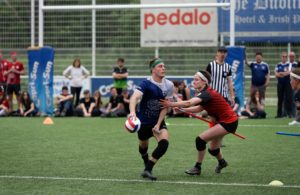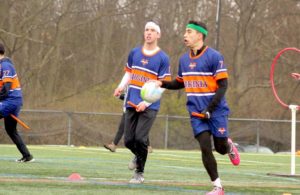- Rule, Britannia, no more?
- Unpopular Opinions: US Quadball Cup 2023
- Proven Contenders: University of Virginia
- Proven Contenders: Rutgers University
- Proven Contenders: University of Michigan
- Proven Contenders: Creighton University
- Different Perspectives: A Look Inside USA Ultimate
- Antwerp QC, Much of Belgian Core, Leaves Competitive Quidditch
Quick Takes: NERC
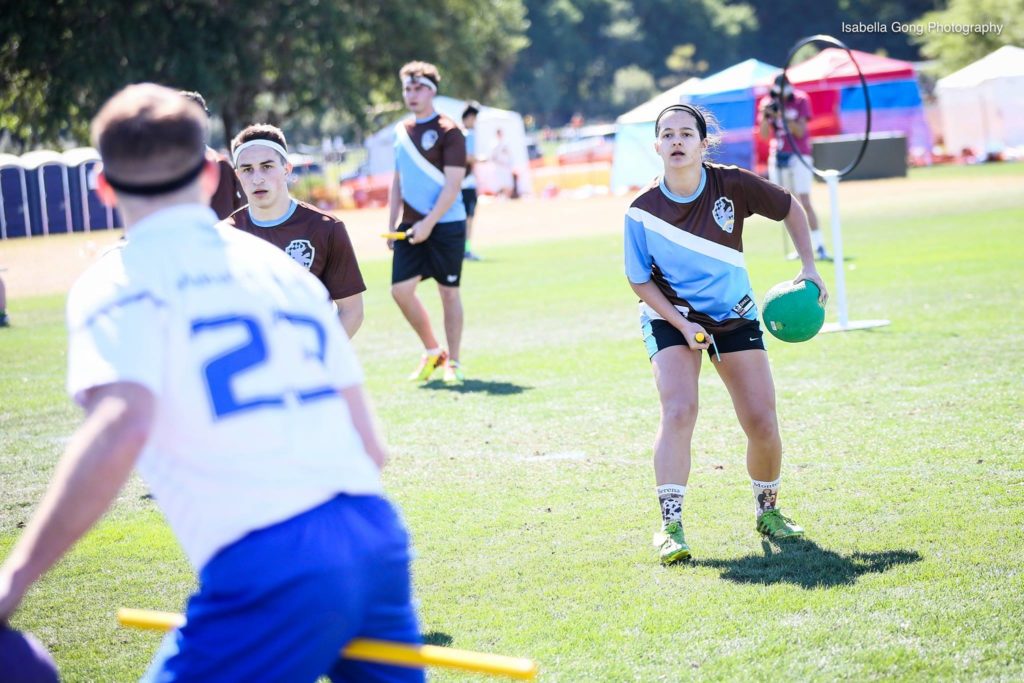
Credit: Isabella Gong
By Ethan Sturm, Managerial Editor
Jayke Archibald, Correspondent
Wide Open Field
For the first time in years, there is no clear-cut favorite in the Northeast. At least five teams—Boston University, RPI, New York University, Tufts University and University of Rochester—have a legitimate shot at the title. Each has a very different makeup of strengths and weaknesses, with no two alike.
Boston University boasts potentially the best quaffle player and beater in the region with Dyllon Carlson and Max Beneke, respectively, but has large question marks outside of them. Most of their wins this season have been on the backs of these two, and almost all of their losses have come later on in tournaments when they have begun to tire. The Terriers’ success will be determined by this pair’s ability to stay healthy, rested and in-form throughout the weekend.
RPI comes loaded in the quaffle game, with a starting line that features four players from the last two renditions of the Boston Night Riders, yet lacks an effective beating game as demonstrated thus far. While RPI’s chasers are superior in all facets of the game to the rest of the region, they have struggled against teams who can keep bludger control and sit on the cross cuts and passes RPI is known for, often settling for contested shots or wayward passes behind the hoops. For them to find success, RPI’s beaters will need to at least play even with the others in the region, hopefully allowing the quaffle players to push their advantages.
Conversely, Rochester has the superior college beater corps in the region, headlined by Perry Wang and Steven Belitzky, yet have a dearth of established quaffle players. While the beaters can set up a strong defensive front and clear lanes for the chasers, said chasers haven’t turned these opportunities into points often enough to get out of range consistently. Rochester will need to focus on their driving and ball-handling to convert more of these no-bludger situations into scores.
New York doesn’t have any singular star, but has high quality across the entire starting lineup, with many experienced upperclassmen. They have no real holes or weaknesses on either side of the ball to exploit, but have struggled when they need a singular player to step up and take control of close games. Their success will ride on one or two of their veterans, such as Molly Potter or Frank Minson, taking this responsibility onto their shoulders and closing out games.
Lastly, Tufts is full of young talent but lacks experience, with most of its best players being in only their second year. The team has an enormously high ceiling, but hasn’t appeared to reach it yet this season, as evidenced by their winless record against the aforementioned teams. This is the tournament where they need their young guns, like John Parrish and Finn McGarghan, to develop into leaders and turn some of those close losses into tough wins.
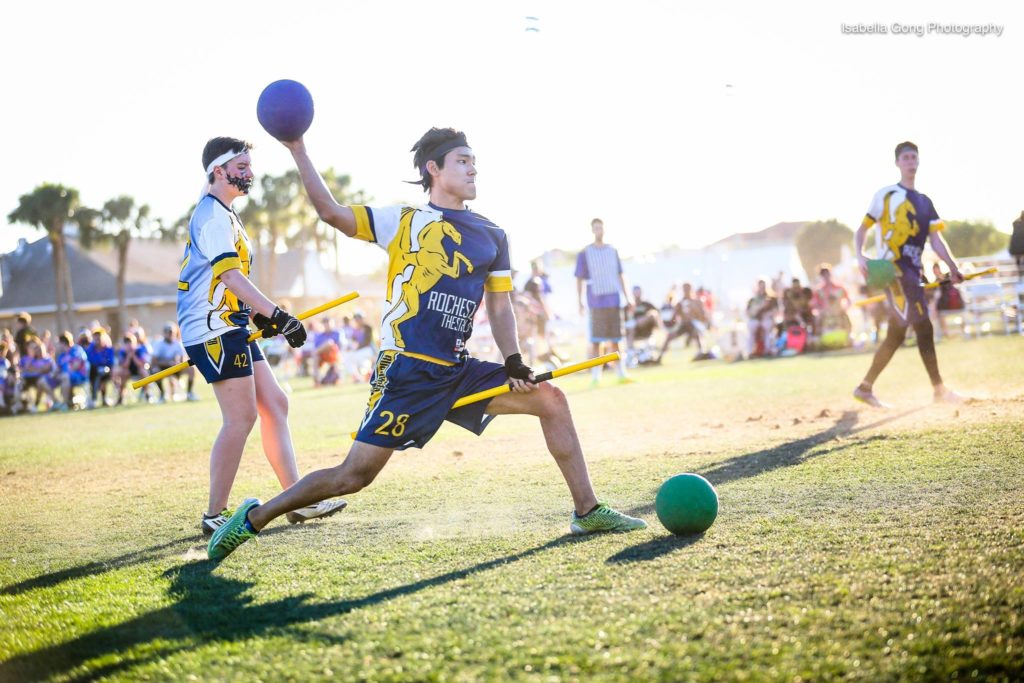
Credit: Isabella Gong
End of an Era
For the first five years of the existence of an official, qualifying Northeast Regional Championship, it would have been just as accurate to call the tournament the Boston Regional Championship. Beantown has won each of the five iterations, with Boston University grabbing the first two, Tufts taking home the third and Quidditch Club Boston going back-to-back over the past two years. The first two tournaments even included a second Bostonian finalist in Emerson College before New York finally broke through that barrier in 2013.
But the streak is finally set to come to a close this weekend in the college division, with potentially even a Boston-less final in the works. Three of the four favorites hail from outside of the Bay State, and while Boston University could very well make the climb all the way back to the peak of the Northeast, the road will be far from simple.
Boston University was doubly set back by the Northeast format, which will force them to go head-to-head with fellow tournament favorite RPI in pool play. RPI won the only official match between the two, 120*-60, while a pair of games from an official tournament in September later thrown out by USQ were split by the two teams. At best, you could probably consider this a coin flip of a match, which gives Boston University at least a 50 percent chance of starting Sunday in the loser’s bracket of the championship, where they would need to win six straight games to take the title, a tall order for a team so completely reliant on Carlson to provide their offense and Beneke to take on top beaters across the region. A minor injury, or even just fatigue, could slow either one and all but seal the team’s fate.
Beyond Boston University, the city really only has fringe contenders. Tufts and Harvard University both have enough talent to give the top teams one or two scares–and Harvard is likely to start in the winner’s bracket of the championship thanks to their pool draw–but Tufts lacks the star power and Harvard the depth to rattle off enough day two wins to truly threaten a win in this format.
Instead, the true contenders in the region are more scattered than ever before. Rochester has an incredibly experienced core–backboned by keeper Basem Ashkar and beaters Perry Wang and Steven Belitzky–and the ability to use a two-male beater set to force other teams to play Rochester’s game. New York also carries plenty of experience, and is perhaps the region’s deepest team, headlined by the play of Minson and Potter, both of whom plied their trade for the New York Titans this past summer. And RPI retains the region’s most organized offense with plenty of athleticism in the quaffle game–where they star Sam Nielsen and Tyler Beckmann–and a beater game that just may be able to do just enough to get them across the line thanks in large part to the play of Fiona Wisehart.
With so much parity in the region, and a bracket format that will see that parity go head-to-head for game after game, this tournament is truly a difficult one to call. Depending on your opinion, anywhere from four to six schools could have a shot at the title. But is easy to see that the city of Boston is more vulnerable than ever. And if now isn’t the time for the dynasty to fall, then when?
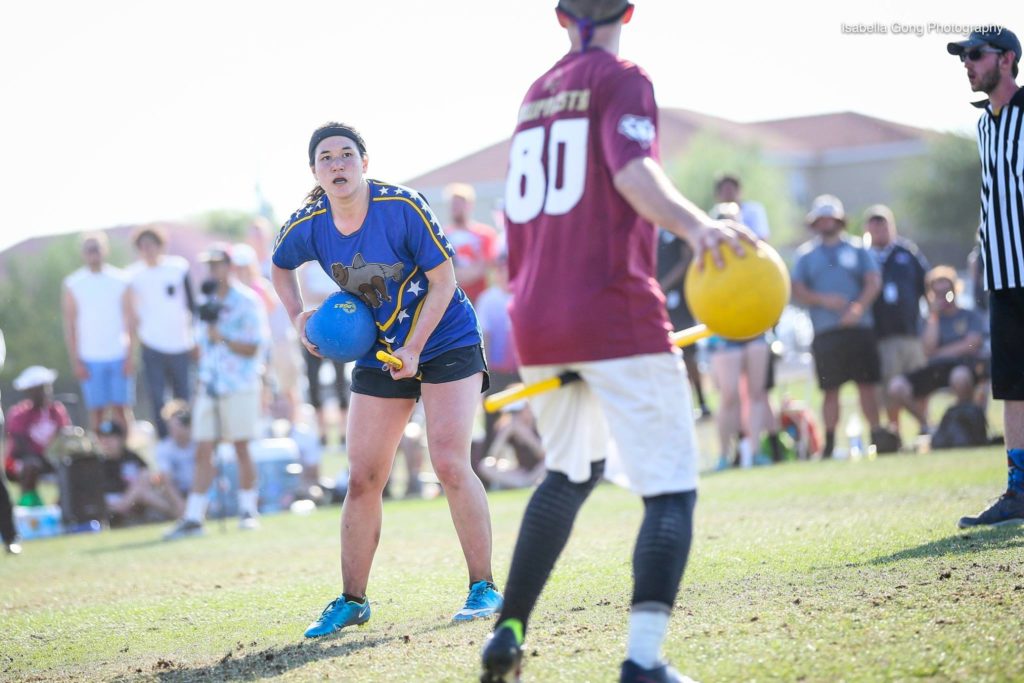
Credit: Isabella Gong
Community Team Bloodbath
While not nearly as exciting as the college field, the community division has plenty of intrigue to offer this weekend as well. With USQ’s decision to award only one US Quidditch Cup 11 bid to the region despite three of the four competing club teams making it to last year’s quarterfinals, USQ has ensured that two of the top ten teams in the country will still be unsure if they will be going to Nationals come spring. Furthermore, with a triple-round-robin format, including the first and last timeslots of both days, USQ is truly putting these teams through the gauntlet for that one bid, forcing each to play nine games over the course of the weekend.
The three, BosNYan Bearsharks, Rochester United and Quidditch Club Boston, have all had mixed results against each other in the past year, and should be considered co-favorites. The champion will likely be determined by who amongst them can stay healthiest during the brutal weekend, especially on a five-game day two where none get a break of longer than one game slot. Games of note include United vs Bearsharks playing in the first timeslot of day one as well as Bearsharks vs Quidditch Club Boston in the last timeslot of day two, which carries with it the possibility of a championship on the line, depending on how the earlier games shake out.
Whomever it is, the winner of the Northeast Regional Community Championship will have truly earned their US Quidditch Cup 11 bid and the ability to rest easy over the winter break. The other two will have to hope the tournament results burgeon their strength of schedule enough to overcome the losses they will have received at the hands of the other two, and figure out ways to play competitive quidditch even before the snow melts and at-large bids are determined.
Player to Watch (alphabetical order)
Chasers
- Frank Minson – New York
- Jon Parrish – Tufts
- Landon Garfinkel – New York
- Marissa Crandall – Boston University
- Molly Potter – New York
- Morgan Bertram – RPI
- Nick Dupre – RPI
- Sabrina Combs – Emerson
- Tyler Beckman – RPI
Keepers
- Dyllon Carlson – Boston University
- Finn McGarghan – Tufts
- Ian Scura – Middlebury College
- James Jones – Harvard
- Sam Nielson – RPI
Beaters
- Janice Lu – New York
- Leo Wu – Emerson
- Max Beneke – Boston University
- Perry Wang – Rochester
- Steven Belitzky – Rochester
- Tristan Levinson-Hayes – Brandeis
Seekers
- Ben Fernandez – Macaulay Marauders

